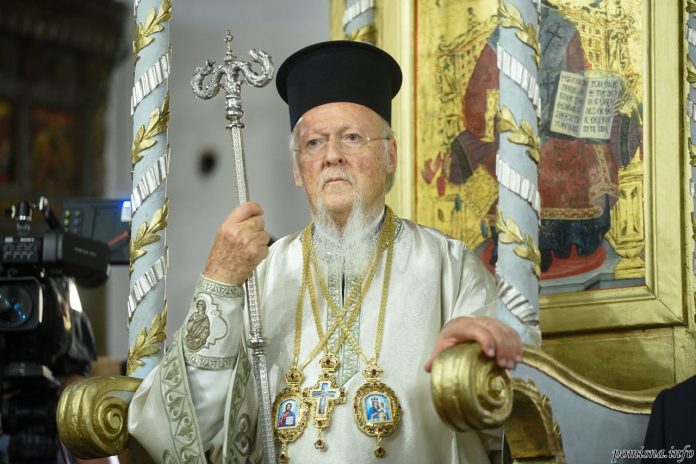An annual pilgrimage of Christians took place on June 11th in Turkey to celebrate the spiritual leader of the world’s approximately 300 million Orthodox faithful. His All-Holiness, Bartholomew, Archbishop of Constantinople, New Rome, and Ecumenical Patriarch, celebrates his patron saint – the Holy Apostle Bartholomew – on that day.
The feast brings together hierarchs, diplomats, politicians, and simple faithful to two sacred Christian sites in the historic city of Constantinople (Istanbul): the Monastery of the Life-Giving Spring at Baloukli for Great Vespers and the Patriarchal Church of St. George the Great Martyr at the Phanar for the Divine Liturgy. This year’s festivities took on added significance as it coincided with the Sunday of All Saints.
Elected to the First Throne of Orthodoxy in October 1991, the tenure of His All-Holiness is in many ways unprecedented. He is the longest-serving Ecumenical Patriarch in the history of the 2,000-year-old local church founded by St. Andrew the First-called Apostle, which include such luminaries of Christendom as John Chrysostom, Gregory the Theologian, and Photios the Great. A leading bishop of Orthodoxy for decades, Bartholomew’s patriarchal ministry began as many traditionally Orthodox countries in Eastern Europe began to unshackle themselves from the stifling yoke of communism.
Through societal paradigm shifts, globalization, wars, recessions, pandemics and other destabilizing phenomena such as the digital revolution, His All-Holiness has remained the one constant figure in global Orthodoxy: from a humble spiritual leader and ardent defender of the faith to a trusted global advocate; from a prudent and wise organizational administrator to an unrelenting servant for truth, justice, and mercy.
It is in the last few years, however, the mettle of the man born a leapling on the island of Imvros in 1940 has been particularly revealed. His steely resolve and tenacity – despite internal Turkish challenges, external (mostly Russian) misinformation campaigns, and other obstacles – have been proven time and time again.
These words, and this characterization, may seem like sentimental rhetoric or a romanticized characterization from a Greek Orthodox author, but the reality paints a picture of the Ecumenical Patriarch as one of the most important religious leaders in the last half-century.
It was at Bartholomew’s initiative that the Ecumenical Patriarchate established September 1st of each year – which coincides with the beginning of the Ecclesiastical New Year – for the Protection of the Natural Environment. He called all people to care for God’s creation long before celebrities and social media influencers jumped on the proverbial bandwagon. In his 2015 environmental encyclical, Pope Francis praised the enduring leadership of His All-Holiness on matters related to the environment, which twenty years earlier earned him the title of “Green Patriarch.”
It was Bartholomew, who lives in increasingly Islamized Turkey, who preached cooperation and dialogue between and among religions before many were open to the idea. Shortly after the terrorist attacks of September 11, 2001, for instance, Bartholomew was instrumental in bringing together Jewish, Christian, and Muslim leaders for a conference on peaceful coexistence in Brussels.
It is Bartholomew who has and continues to spearhead global initiatives to bring hope to the hopeless and comfort to the impoverished. From leading international symposia to help curtail human trafficking, especially of women and girls, to providing direct pastoral support to refugees in the Eastern Mediterranean, to visiting Poland, at the personal invitation of that country’s president, to pray with and give love to Ukrainian families displaced as a result of Russia’s unilateral and ongoing war in Ukraine.
It was Bartholomew who despite intense, albeit underhanded, opposition from Russia and the Moscow Patriarchate, together with their well-funded proxies of convenience, convened the 2016 Holy and Great Council in Crete, Greece. This historic gathering, almost one-century in the making, brought together hundreds of hierarchs from the vast majority of independent (autocephalous) local Orthodox churches to con-celebrate the Divine Liturgy – the most important symbol of Orthodox unity – and to discuss and agree upon important texts that are consistent with Orthodox tradition but speak to today’s community of faithful.
And it was Bartholomew, above all, who, with the support of his synod, granted autocephaly to the Orthodox Church in Ukraine (OCU), a move so reviled by the Moscow Patriarchate that they resorted by deploying the “nuclear” option in its long-running war to dethrone Constantinople as the leader of Orthodoxy, namely, severing all communal ties with Constantinople, together with other local churches who support the OCU.
It is in Ukraine, both before and after Russia’s invasion, that illustrates not only the identity of His All-Holiness, but also that of his detractors. Whereas Bartholomew provided spiritual freedom for the Orthodox of Ukraine and supports them in their sacrifices to achieve peace and territorial integrity, his opponents wish to keep the faithful in Ukraine subservient and characterize Russia’s invasion as a “holy war.” Bartholomew will be remembered as the humble Patriarch who desired not to be the greatest, but the servant of all.
It was this humility that was in full display during the Holy Week and Paschal celebrations on his native Imvros earlier this year. There, amidst a small yet growing and vibrant Orthodox community, did the Ecumenical Patriarch celebrate the triumphant feast of the Resurrection. Not in lavish cathedrals constantly surrounded by bodyguards, but as a spiritual leader who despite honors and awards, degrees and distinctions, is a man from, of, and for the people. It is this mindset and Orthodox ethos that attracts so many pilgrims from around the world to visit Constantinople to meet and receive the blessings of a pious Patriarch.

